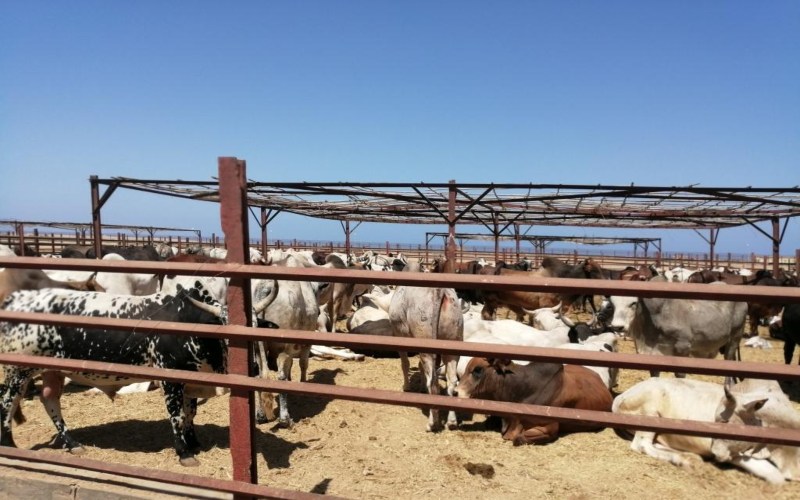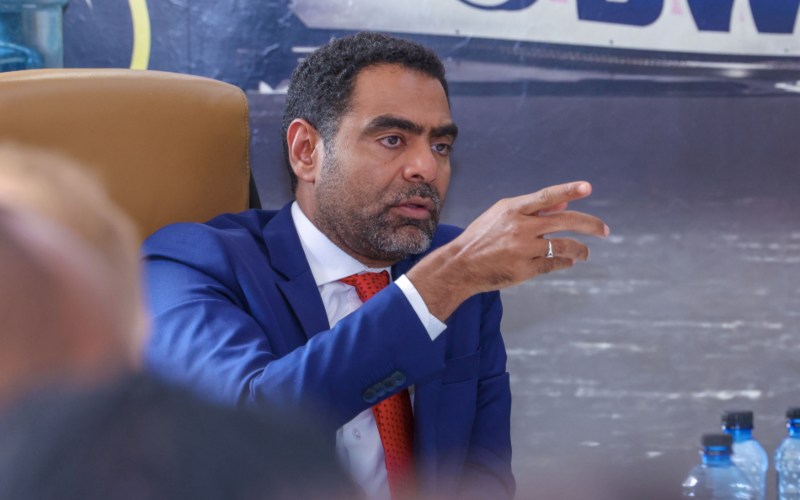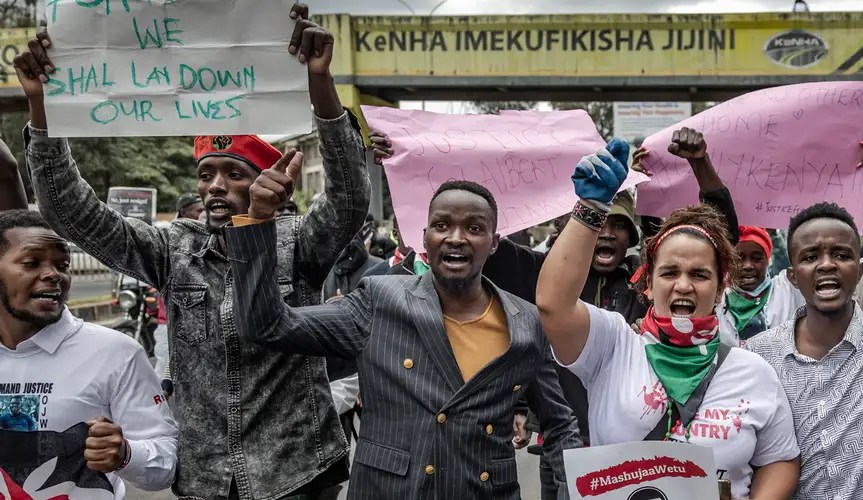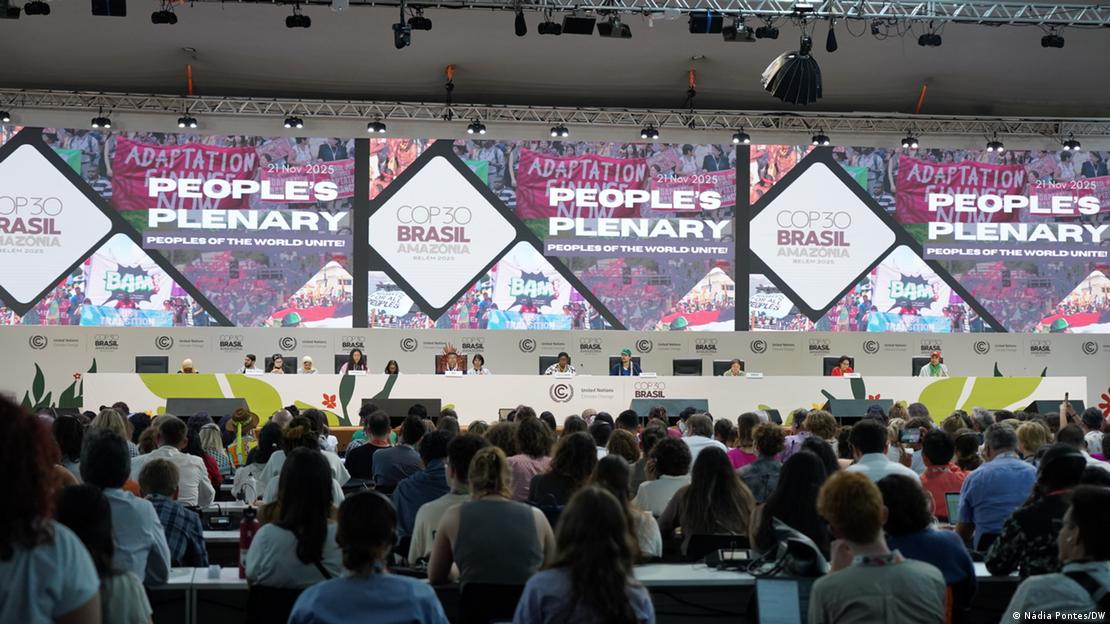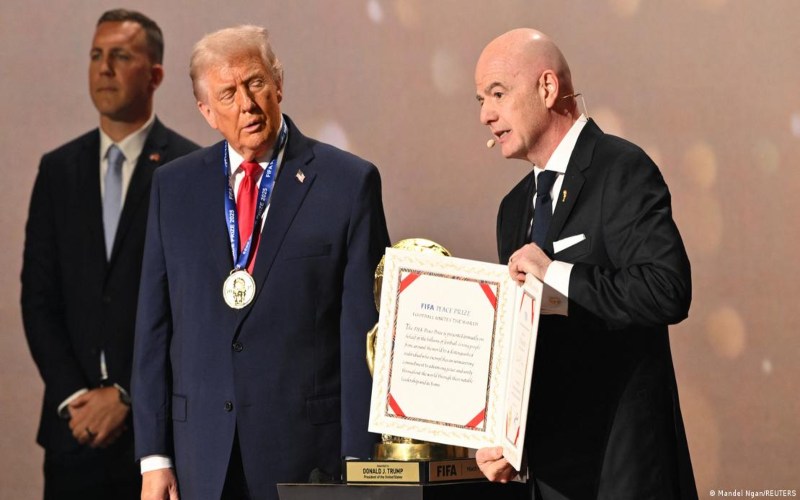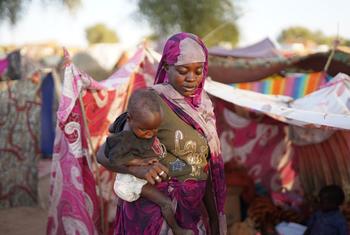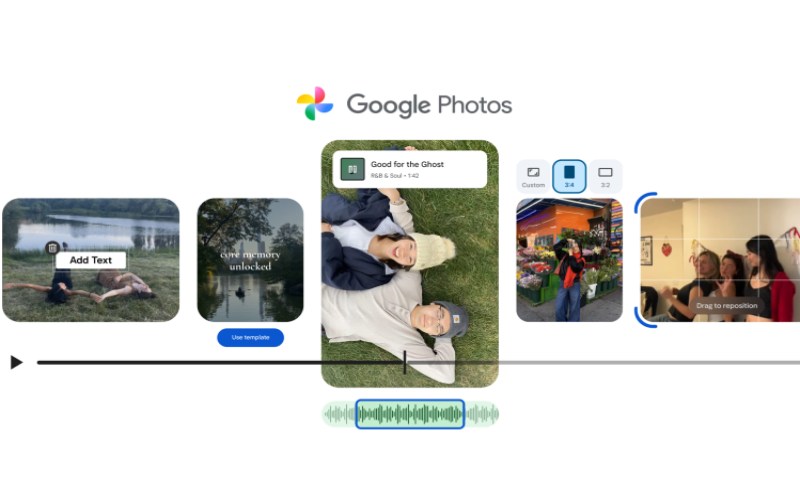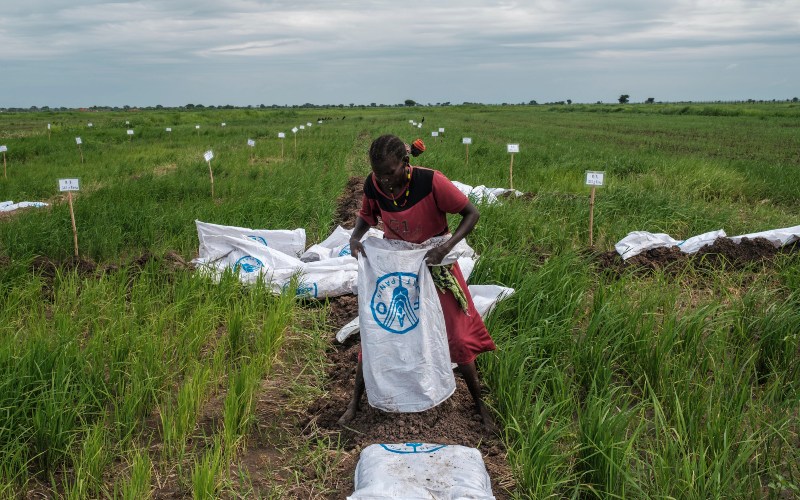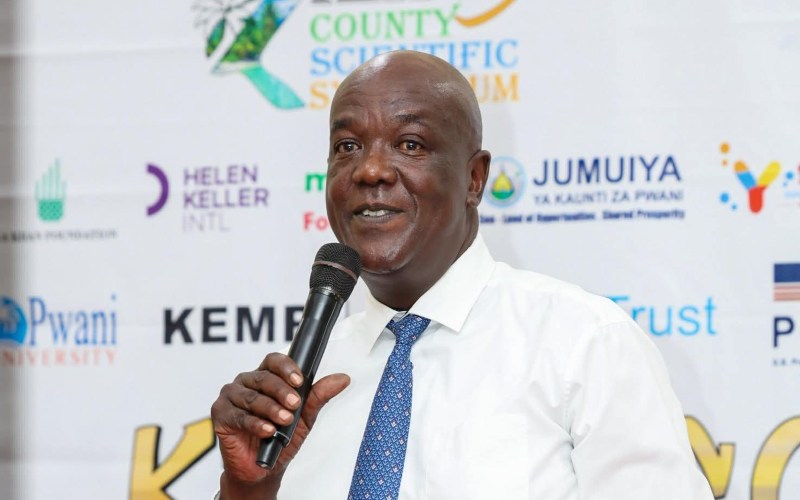Inside Githurai Social Justice Centre, where community voices refuse to be silenced
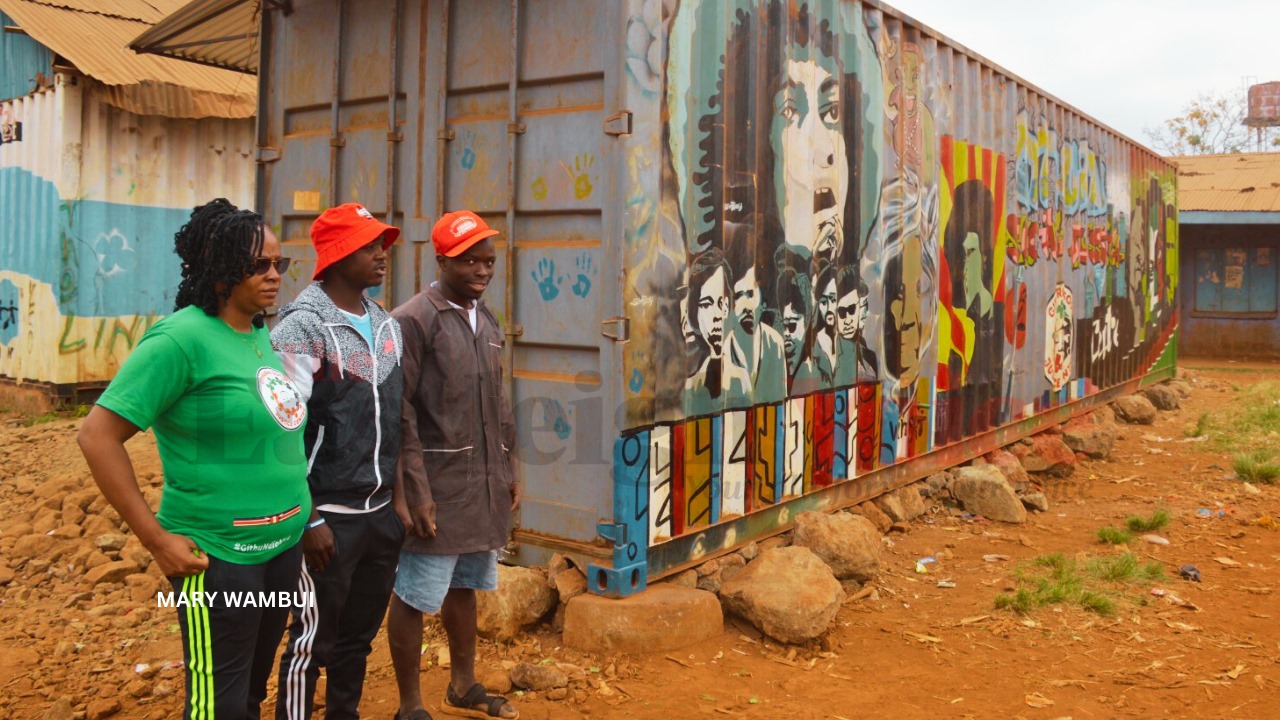
The Githurai Social Justice Centre, which today forms a key part of a growing movement across Nairobi's informal settlements, providing a space where communities are reclaiming their voice and pursuing justice collectively.
For a long time in Githurai, young people would squeeze into cramped rooms to talk about the injustices shaping their lives, among them police crackdowns, land disputes, and the quiet suffering of gender-based violence.
Among them was Njoki Gachanja, who recalls how those early gatherings of the Githurai Human Rights Network slowly transformed into something bigger, the Githurai Social Justice Centre, which today forms a key part of a growing movement across Nairobi's informal settlements, providing a space where communities are reclaiming their voice and pursuing justice collectively.
More To Read
- Social justice movements form Kenya Left Alliance, vow to contest all seats in 2027 polls
- Inside Mathare’s fight for justice: How youth are taking on police brutality and reclaiming dignity
- Mukuru Community Justice Centre condemns alleged forced evictions over affordable housing project
- DCI summons Mukuru activists over suspected links to BBC documentary "Blood Parliament"
- Rights groups fear cover-up in Mukuru kwa Njenga mass deaths
- Human Rights Watch demands release of report on probe of Kware murders
This was around 2016, when she and her like-minded colleagues who'd formed the network got to learn the concept of a social justice centre and the example set in Mathare.
"Since a number of us were very passionate about social justice, human rights and so forth, we thought of replicating the idea towards the end of 2016," Njoki, the coordinator of the Githurai Social Justice Centre, recalls.
It was around the same time that the Social Justice Movement was taking root in Kenya. A meeting of like-minded youth had given rise to the network of social justice centres that now serve informal settlements in Nairobi, where residents, long subjected to police excesses, often felt the scales of justice were never meant to tilt in their favour.
Njoki says, at the time, she and her fellow human rights activists in Githurai realised their biggest human rights challenges their community (Githurai 44 and 45) were facing were police excesses, including Extra Judicial Killings (EJKs), followed by Gender Based Violence and land issues.
"This was the period when young men were being killed, with the community largely supportive under the prevailing narrative that they were thugs. Yet, some of us knew that not all those killed were linked to criminality, and we felt a deep urge to tell our stories and challenge that narrative," she said.
The following year, 2017, they adopted the name Githurai Social Justice Centre and had it registered as a Community-Based Organisation (CBO) in 2019.
They also established six pillars to guide their activities, namely: Youth, crime, drugs and extremism; children and women; Sexual and Reproductive Health Rights; Gender Based Violence; Civil and political education as well as human rights and social justice.
She says the civil and political education pillar is one of the centre's strongest pillars today.
"We started from a very naïve place, complaining of the basic issues our people struggle with, including injustices, but through multiple trainings and learning, we realised that they are systemic issues. We are not poor because, as our parents used to tell us, God willed it. We are poor because the system is very intentional about oppressing people from informal settlements, and that's why we started engaging in political education, because we felt that for people to get the change they so desire, they must internalise these issues from a knowledge point of view," she adds.
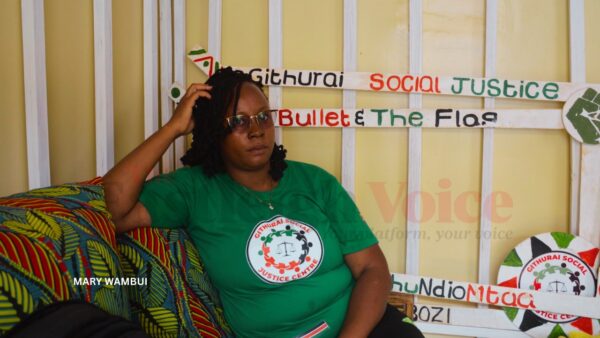 Njoki Gachanga, the coordinator of Githurai Social Justice Centre, speaks to The Eastleigh Voice from the office in Githurai 44. (Photo: Mary Wambui)
Njoki Gachanga, the coordinator of Githurai Social Justice Centre, speaks to The Eastleigh Voice from the office in Githurai 44. (Photo: Mary Wambui)
Bit by bit, she explained, residents began to understand that a corrupt figure in society could start a fire and then be the first to offer help in putting it out after achieving his own goal, and that some water issues were deliberately created by people seeking to commodify the resource for their personal gain.
"This was happening while the law has clearly stipulated that access to water quality health care, decent housing, and education are a basic right of everyone. We started educating the people on this, and they received it well," she recalls.
The journey has, however, not been easy for the centre. At multiple points, they clashed with the police while following up on cases that some rogue officers preferred to remain unaccountable for, with certain officers disrupting their meetings, arresting them and issuing threats.
Other Topics To Read
- Headlines
- City Affairs
- Social Justice Movement (SJM)
- mathare social justice centre
- Social Justice Centres Working Group
- githurai protests
- githurai killings
- Kasarani Social Justice Centre
- Mukuru Social Justice Centre
- Mukuru Community Social Justice Centre
- Githurai Social Justice Centre
- Inside Githurai Social Justice Centre
- where community voices refuse to be silenced
"The arbitrary arrests were a form of intimidation, but the more they happened, the more resilient we became, as one arrest would trigger a ripple effect across the other centres and heighten calls for solidarity. It also helped that some of the major human rights organisations like Katiba Institute, the International Justice Mission (IJM), and Amnesty International began training us on how to monitor and document these cases," she recalls.
The centre was also taught not to tamper with a crime scene, referral mechanisms for cases that they cannot handle and so forth. Such as sexual and gender-based violence cases that they refer to organisations such as the Wangu Kanja Foundation, FIDA and CREAW Kenya. Land issues to the National Land Commission (NLC) and those involving police excesses to the IJM.
A few years ago, the collaboration ushered in a turning point for the centre by bringing together criminal justice actors from the judiciary, to witness protection and the Independent Policing Oversight Authority (IPOA), to Githurai for a first-ever dialogue on police excesses and related human rights issues in the area. The meeting bore good fruit in that police officers began acknowledging that the centre's work was making an impact in the community.
"Soon after, we realised that every case that would be referred to the stations from us would be treated with some level of dignity, unlike before when they would dismiss us as just mere activists," she recalls.
Njoki and some of her colleagues have since decided to up their skills to serve the community better. She is pursuing Law while some of her colleagues have studied counselling, others are trained as paralegals and so forth.
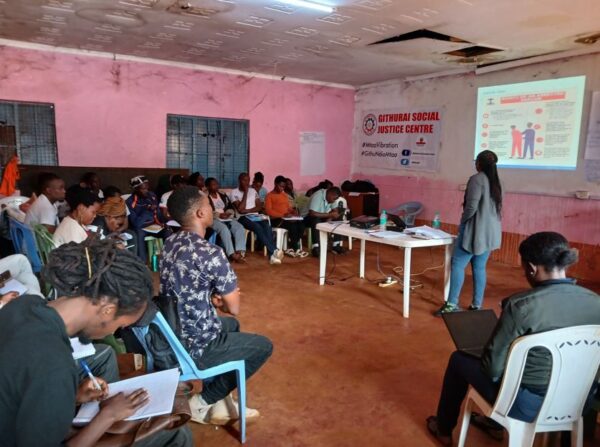 Human rights defenders and monitors’ training on the rights of arrested persons and how the criminal justice system works at the Githurai Social Justice Centre in Nairobi. (Photo: Githurai Social Justice Centre)
Human rights defenders and monitors’ training on the rights of arrested persons and how the criminal justice system works at the Githurai Social Justice Centre in Nairobi. (Photo: Githurai Social Justice Centre)
"A change of regime has, however, sent us back to square one because the behaviour exhibited by some police officers is akin to what we used to witness in the past; you almost don't want to mention that you are an activist. It is so sad because it's like we are backtracking on the milestones we had achieved; it's worse because they feel they have some form of protection from above," she says.
Such has led to instances where some officers whose excesses have been reported to oversight bodies have, in turn, called them to issue threats.
"These oversight agencies need to exercise confidentiality; otherwise, this behaviour is going to discourage many from reporting to them. One of the advantages that we have is that we are so grounded in the community, and the people know that this is our home, we are here to stay, thus it's easier to trust us," she notes.
Njoki believes that if something were to shut down the centre, the people would suffer more from police excesses. But, even beyond checking on police conduct, the centre helped dispel misinformation that spread during Gen Z's protests last year, which claimed that security agencies conducted a massacre in Githurai.
"What people do not understand is that Githurai is like a political hot zone, where on one side (Githurai 44) we have a cosmopolitan community and on the other side (Githurai 45), that is Kiambu and Central Kenya's gateway to the city. So, a lot of political manipulation happens around here," she says.
When the claims that a massacre gained momentum following the June 25th protests last year, she says, they checked on their neighbours, contacts, hospitals and markets looking for hints of the claimed bodies but couldn't immediately find any missing people.
"It was at St John's hospital that we found a list of about 11 people who had been treated for gunshot wounds and referred to Thika level five hospital, Kiambu level five or Kenyatta National Hospital. At the city mortuary, we only found one body that had been registered as having been brought from Githurai. We agreed that we are in a very tricky moment in our country, but we shall not trivialise life. Yes, there was a lot of violence around here at the time, but 400 people were not killed. We came under heavy attack for telling the truth, but we stood firm. We have been covering EJKs around here since 2016, and everybody knows that, so how then was it that this time something was happening without us getting a clue about it?" she wondered.
At the time, the centre's role evolved from being a champion for justice to a voice of sanity in times of chaos and political instability.
In a festival dubbed as Kimoja festival on July 26th, the centre brought together young people to dialogue on the misuse of some by politicians to commit crimes during protests. The meeting sought to discourage such tendencies and send a warning to those who get misguided by politicians that the community will hold them accountable.
Today, the centre operates out of a container office donated by IJM and perched on a public land that was at risk of being grabbed.
Top Stories Today
